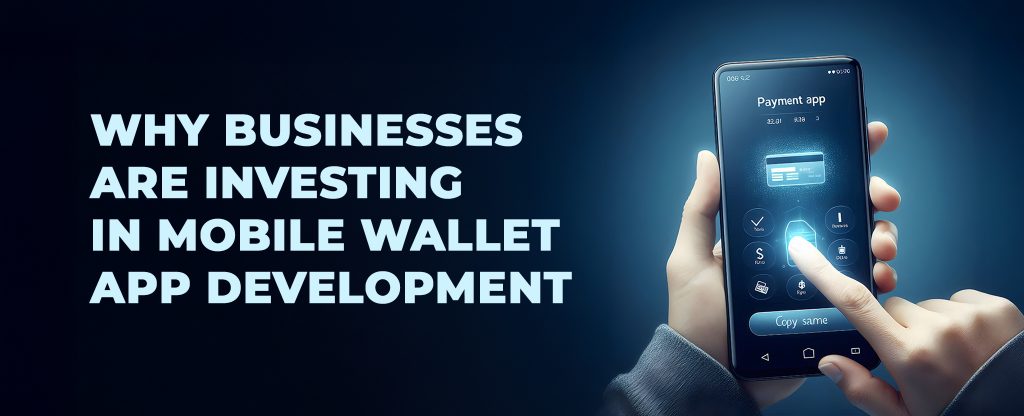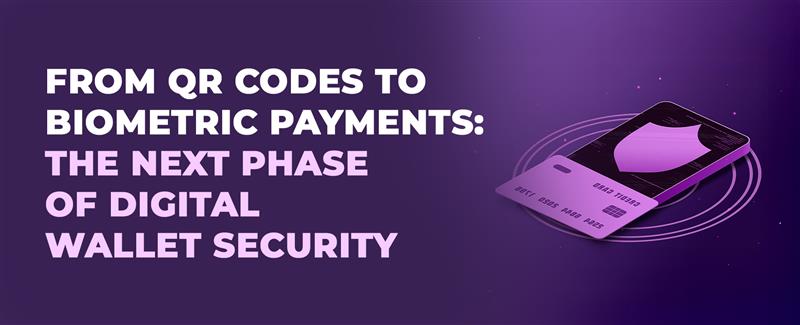Why Businesses Are Investing in Mobile Wallet App Development
10 Jul 25 


The way we pay for goods and services has changed dramatically in recent years. With smartphones becoming an essential part of daily life, the demand for mobile wallet apps has soared. These digital solutions allow users to make payments, transfer money, and manage finances all from the convenience of their mobile devices. For businesses, this shift is more than just a technological trend; it represents a powerful opportunity to connect with customers, streamline operations, and stay competitive in a rapidly evolving market.
As cashless transactions become the norm, companies across industries are investing in mobile wallet app development. The reasons are clear: customers want speed, security, and convenience, while businesses seek efficiency, data insights, and new revenue streams. In this blog, we’ll explore what mobile wallet apps are, why they’re gaining traction, and the key benefits driving business investment in this space.
What is a Mobile Wallet App?
A mobile wallet app is a digital platform that allows users to store, manage, and transfer money electronically using their smartphones. Think of it as a virtual version of your physical wallet, but with added features and enhanced security. Mobile wallet apps let users link their bank accounts, credit/debit cards, and even loyalty programs, enabling seamless payments both online and in-store. Popular examples include Apple Pay, Google Pay, and PayPal.
Unlike traditional wallets, mobile wallets offer much more than just payment capabilities. They support peer-to-peer transfers, bill payments, ticket bookings, and rewards tracking. Advanced security measures such as biometric authentication, encryption, and tokenization, protect sensitive financial information and reduce the risk of fraud. For businesses, integrating a mobile wallet app means providing customers with a fast, secure, and user-friendly way to transact, which can significantly enhance the overall customer experience.
Key Features of a Mobile Wallet App
- Secure Storage of Payment Information: Safely stores credit/debit cards, bank accounts, and sometimes loyalty cards or IDs, using encryption and tokenization for enhanced security25.
- Peer-to-Peer (P2P) Transfers: Allows users to instantly send or receive money to and from other users using phone numbers, emails, or QR codes.
- Bill Payments and Recharges: Enables payment of utility bills, rent, mobile recharges, and other services directly from the app.
- Transaction History and Notifications: Provides a detailed log of all transactions and sends real-time notifications for each activity, helping users track and manage their finances.
- Management of Virtual Cards: Lets users add, store, and manage multiple debit/credit cards securely within the app, supporting easy top-ups and payments.
- Integration with Multiple Payment Methods: Supports payments via bank transfers, cards, and sometimes cryptocurrencies, ensuring flexibility for users.
- Contactless Payments: Facilitates NFC or QR code-based payments for fast, secure, and touchless transactions at physical stores.
- Automated Payments: Allows users to schedule recurring payments such as subscriptions or bills, streamlining regular transactions.
- Expense Tracking and Budgeting Tools: Offers features to monitor spending, categorize expenses, and set budgets for better financial management.
- Customer Feedback and Support: Includes options for users to provide feedback or access support directly through the app.
Reasons Why Businesses Are Investing in Mobile Wallet App Development
1. Enhanced Customer Experience
One of the main drivers for businesses to invest in mobile wallet apps is the improved customer experience they offer. Mobile wallets make payments fast, easy, and convenient, eliminating the need for cash or physical card. Customers can complete transactions with just a tap or scan, reducing wait times at checkout and making the entire process smoother. This convenience encourages repeat business and builds customer loyalty.
Moreover, mobile wallet apps often integrate with loyalty programs, allowing users to earn and redeem rewards instantly. This seamless experience not only delights customers but also increases their engagement with the brand. By providing a hassle-free payment solution, businesses can differentiate themselves from competitors and attract tech-savvy consumers who prioritize efficiency and ease of use.
2. Increased Sales and Customer Base
Mobile wallet apps help businesses expand their customer base and boost sales. As more consumers, especially younger generations utilize digital payments, offering a mobile wallet option becomes essential to meet their expectations. By catering to this growing segment, businesses can attract new customers who prefer cashless transactions.
Additionally, mobile wallets enable businesses to offer digital coupons, vouchers, and promotional deals directly through the app. This targeted approach can drive more purchases and encourage impulse buying. The convenience of instant payments also reduces cart abandonment rates in e-commerce, leading to higher conversion rates and increased revenue.
3. Cost Reduction and Operational Efficiency
Handling cash and traditional card payments involves various costs, from transaction fees to expenses related to cash management and security. Mobile wallet apps reduce these costs by streamlining payment processing and minimizing the need for physical infrastructure. Digital transactions are often cheaper to process than credit card payments, helping businesses save on fees.
Furthermore, mobile wallets can automate recurring payments and simplify accounting, freeing up staff time and reducing administrative overhead1. This operational efficiency allows businesses to focus resources on growth and innovation rather than routine payment tasks. For startups and small businesses, these savings can make a significant difference in profitability.
4. Robust Security Features
Security is a top concern for both businesses and consumers. Mobile wallet apps offer advanced security features that protect sensitive financial data and reduce the risk of fraud. Technologies such as encryption, tokenization, and biometric authentication (like fingerprint or facial recognition) ensure that transactions are safe and user information is kept confidential.
For businesses, this means fewer incidents of fraud and chargebacks, which can be costly and damage reputation. Customers are more likely to trust and use payment solutions that prioritize their security. By investing in secure mobile wallet apps, businesses not only protect themselves but also build trust and credibility with their customers.
5. Access to Valuable Data and Analytics
Mobile wallet apps provide businesses with access to rich customer data, including purchase history, transaction patterns, and spending habits This information is invaluable for understanding customer preferences and tailoring marketing strategies. By analyzing this data, businesses can create personalized offers, promotions, and loyalty programs that resonate with their audience.
Data-driven insights also help businesses identify trends, forecast demand, and make informed decisions about product offerings and inventory management. The ability to track customer behavior in real-time gives companies a competitive edge, enabling them to respond quickly to changing market conditions and customer needs.
6. Scalability and Global Reach
A well-designed mobile wallet app can scale easily to accommodate business growth and expansion into new markets1. Unlike traditional payment systems, digital wallets are not limited by geography. They can support multiple currencies, languages, and payment methods, making it easier for businesses to serve international customers1.
This scalability is especially valuable for e-commerce and retail businesses looking to expand globally. By offering a mobile wallet solution, companies can tap into new customer segments and increase their market share without significant additional investment in infrastructure.
7. Integration with Loyalty and Rewards Programs
Mobile wallet apps often integrate seamlessly with loyalty and rewards programs, providing additional value to customers and businesses alike. Users can track their points, redeem rewards, and receive personalized offers—all within the app. This integration encourages repeat purchases and strengthens customer loyalty.
For businesses, digital loyalty programs are easier to manage and more cost-effective than traditional paper-based systems. They also provide valuable data on customer engagement and preferences, allowing for more targeted marketing efforts. By combining payments and rewards in a single platform, businesses can enhance customer satisfaction and drive long-term retention.
Additional Benefits for Specific Industries
The rise of mobile wallet apps is not limited to any single industry. E-commerce and retail businesses benefit from faster checkouts and reduced cart abandonment. Hospitality and travel companies use mobile wallets for seamless bookings and contactless payments. Even healthcare providers are adopting digital wallets for bill payments and appointment scheduling.
In each case, mobile wallet apps help businesses streamline operations, improve customer service, and adapt to changing consumer expectations. As industries continue to digitize, the ability to offer secure and convenient payment solutions becomes a key differentiator.
Challenges and Considerations
While the benefits of mobile wallet app development are clear, businesses must also navigate several challenges. Developing a secure, user-friendly, and feature-rich app requires significant investment in technology and expertise. Companies must ensure compliance with financial regulations, protect user data, and integrate with various payment gateways and financial institutions9.
User adoption can also be a hurdle, especially in markets where cash is still prevalent. To succeed, businesses need to educate customers about the benefits of mobile wallets and provide incentives for adoption. Partnering with experienced app developers and focusing on user experience are critical steps in overcoming these challenges.
Final Words
The shift toward digital payments is reshaping the business landscape. Mobile wallet apps have emerged as a vital tool for companies seeking to enhance customer experience, improve operational efficiency, and stay ahead of the competition. By investing in mobile wallet app development, businesses can offer secure, convenient, and rewarding payment solutions that meet the needs of today’s digital-savvy consumers.
From cost savings and data insights to scalability and customer loyalty, the advantages are compelling. As technology continues to evolve, mobile wallets will play an even greater role in how we manage and spend money. For businesses, the time to invest in mobile wallet app development is now—those who embrace this trend will be well-positioned for success in the digital economy.
- Agentic AI1
- Android Development3
- Artificial Intelligence38
- Autopay1
- Classified App3
- Custom App Development5
- Digital Transformation12
- Doctor Appointment Booking App14
- Dropshipping1
- Ecommerce Apps40
- Education Apps2
- Fintech-Apps38
- Fitness App4
- Flutter4
- Flutter Apps20
- Food Delivery App5
- Grocery App Development1
- Grocery Apps3
- Health Care10
- IoT2
- Loyalty Programs11
- Matrimony Apps1
- Microsoft1
- Mobile App Maintenance2
- Mobile Apps134
- On Demand Marketplace1
- Product Engineering6
- Progressive Web Apps1
- React Native Apps2
- Saas Application2
- Shopify9
- Software Development3
- Taxi Booking Apps7
- Truck Booking App5
- UI UX Design8
- Uncategorized7
- Web App Development1



















Comments